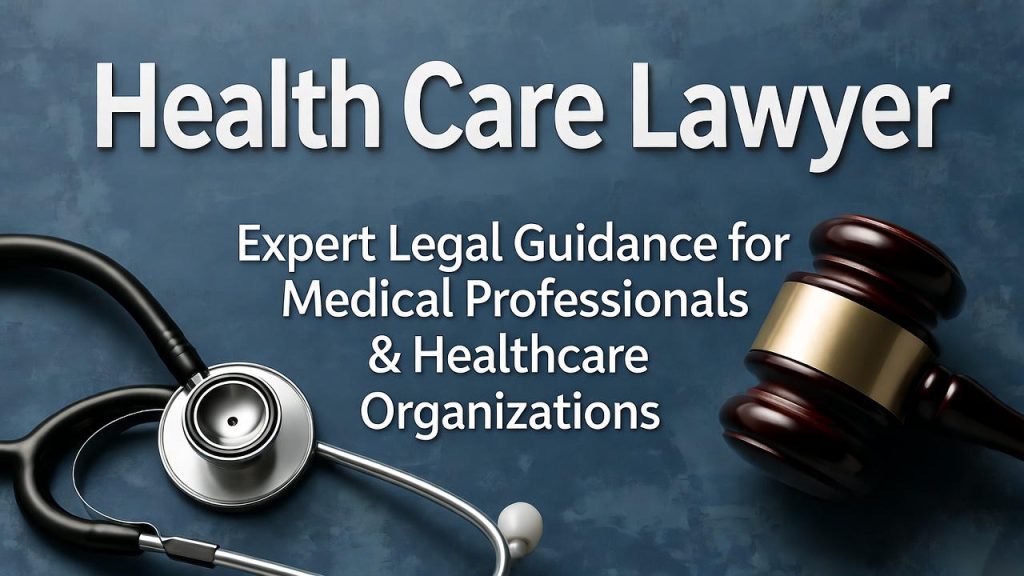Health care lawyers play a vital role in the ever-evolving landscape of the healthcare industry. From ensuring compliance with complex regulations to representing clients in disputes, these legal professionals provide critical guidance to healthcare providers, institutions, and patients. This article explores the responsibilities, importance, and benefits of hiring a healthcare lawyer, offering insights into how they help navigate the intricate legal framework of healthcare.
What Is a Health Care Lawyer?
A health care lawyer is a legal professional specializing in laws and regulations governing the healthcare industry. They provide legal advice and representation to hospitals, physicians, insurance companies, pharmaceutical firms, and patients. Their expertise spans a wide range of issues, including regulatory compliance, medical malpractice, patient rights, and healthcare policy.
Health care lawyers are well-versed in federal and state laws, such as the Health Insurance Portability and Accountability Act (HIPAA), the Affordable Care Act (ACA), and Medicare/Medicaid regulations. Their role is to ensure that their clients adhere to these laws while protecting their interests in legal disputes or transactions.

Why Are Health Care Lawyers Essential?
The healthcare industry is one of the most heavily regulated sectors in the United States. With constantly changing laws and policies, healthcare providers and organizations face significant legal risks. A health care lawyer helps mitigate these risks by offering expert guidance on compliance, contracts, and litigation.
For example, a hospital may need assistance drafting contracts with vendors, while a physician might require representation in a malpractice lawsuit. Similarly, patients may seek a health care lawyer to advocate for their rights in cases of medical negligence or denied insurance claims. The expertise of a health care lawyer ensures that all parties navigate these challenges effectively.
Key Responsibilities of a Health Care Lawyer
Health care lawyers handle a diverse range of tasks, depending on their clients’ needs. Below are some of their primary responsibilities:
1. Ensuring Regulatory Compliance
Healthcare organizations must comply with numerous federal and state regulations. Health care lawyers help clients understand and adhere to laws like HIPAA, which protects patient privacy, and the Stark Law, which governs physician referrals. Non-compliance can result in hefty fines, loss of licensure, or reputational damage.

How Health Care Lawyers Assist with Compliance
- Auditing Practices: Conducting internal audits to identify potential compliance issues.
- Policy Development: Creating policies and procedures to align with regulatory requirements.
- Training Programs: Educating healthcare staff on legal obligations and best practices.
2. Handling Medical Malpractice Cases
Medical malpractice is a significant area of focus for health care lawyers. They represent healthcare providers accused of negligence or patients seeking compensation for harm caused by substandard care.
Common Malpractice Issues
- Misdiagnosis or delayed diagnosis
- Surgical errors
- Medication mistakes
- Failure to obtain informed consent
Health care lawyers investigate claims, gather evidence, and negotiate settlements or represent clients in court.
3. Drafting and Reviewing Contracts
Contracts are a cornerstone of healthcare operations, from employment agreements to vendor partnerships. Healthcare lawyers ensure these contracts are legally sound and protect their clients’ interests.
Types of Contracts Handled
- Physician employment agreements
- Vendor and supplier contracts
- Partnership agreements between healthcare entities
- Insurance and reimbursement contracts
4. Advising on Mergers and Acquisitions
The healthcare industry frequently sees mergers, acquisitions, and joint ventures. Healthcare lawyers guide organizations through these complex transactions, ensuring compliance with antitrust laws and other regulations.
Key Considerations in M&A
- Due diligence to assess legal risks
- Negotiating the terms of the deal
- Ensuring compliance with state and federal laws
Benefits of Hiring a Health Care Lawyer
Hiring a healthcare lawyer offers numerous advantages for healthcare providers, organizations, and patients. Here are some key benefits:

Read More
1. Risk Mitigation
By ensuring compliance with regulations and proactively addressing legal issues, health care lawyers help clients avoid costly penalties and lawsuits. Their expertise minimizes risks associated with non-compliance or poorly drafted contracts.
2. Expert Representation in Disputes
Whether it’s a malpractice claim or a billing dispute with an insurance company, healthcare lawyers provide skilled representation. They advocate for their clients’ interests, whether through negotiation or litigation.
3. Streamlined Operations
Health care lawyers help organizations streamline their operations by developing compliant policies and procedures. This allows healthcare providers to focus on patient care rather than legal concerns.
4. Protection of Patient Rights
For patients, health care lawyers are advocates who ensure their rights are upheld. This includes addressing issues like denied insurance claims, violations of patient privacy, or inadequate care.
How to Choose the Right Health Care Lawyer
Selecting the right health care lawyer is critical to addressing your specific needs. Here are some factors to consider:
1. Experience and Specialization
Look for a lawyer with extensive experience in health care law. Specialization in areas like medical malpractice, regulatory compliance, or healthcare mergers is a plus.
2. Reputation and Track Record
Research the lawyer’s reputation and past successes. Client reviews, case outcomes, and professional affiliations can provide insight into their expertise.
3. Communication and Accessibility
Choose a lawyer who communicates clearly and is accessible when you need them. Healthcare issues often require timely responses, so responsiveness is key.
4. Cost and Billing Structure
Understand the lawyer’s fee structure upfront. Some charge hourly rates, while others offer flat fees for specific services. Ensure the costs align with your budget.
The Future of Health Care Law
The healthcare industry is constantly evolving, with new technologies, policies, and regulations shaping its future. Health care lawyers will continue to play a pivotal role in addressing emerging challenges, such as:
- Telemedicine: As telehealth grows, lawyers will need to navigate regulations around virtual care and cross-state licensing.
- Data Privacy: With increasing reliance on electronic health records, protecting patient data under laws like HIPAA will remain a priority.
- Healthcare Reform: Changes in healthcare policy, such as updates to the ACA, will require legal expertise to ensure compliance.
Emerging Trends in Health Care Law
- Artificial Intelligence: AI in healthcare raises ethical and legal questions, including liability for AI-driven diagnoses.
- Value-Based Care: Shifting from fee-for-service to value-based care models requires new legal frameworks for reimbursement and contracts.
- Cybersecurity: Health care lawyers will increasingly focus on protecting organizations from data breaches and cyberattacks.
FAQ About Health Care Lawyers
What does a health care lawyer do?
A health care lawyer provides legal advice and representation to healthcare providers, organizations, and patients. They handle issues like regulatory compliance, medical malpractice, contracts, and patient rights.
When should I hire a health care lawyer?
You should hire a health care lawyer if you’re facing a legal issue in the healthcare industry, such as a malpractice claim, compliance concern, or contract dispute. They can also provide proactive guidance to prevent legal problems.
How much does a health care lawyer cost?
Costs vary depending on the lawyer’s experience, location, and the complexity of the case. Some charge hourly rates, while others offer flat fees. Discuss fees upfront to understand the cost structure.
Can a health care lawyer help with insurance disputes?
Yes, health care lawyers can assist with insurance disputes, such as denied claims or coverage issues. They advocate for patients or providers to resolve these disputes effectively.
What qualifications should a health care lawyer have?
A health care lawyer should have a law degree, a valid license to practice, and specialized experience in healthcare law. Additional certifications or memberships in healthcare law associations are beneficial.
How do health care lawyers stay updated on regulations?
Health care lawyers stay informed through continuing education, professional associations, and monitoring updates from regulatory bodies like the Department of Health and Human Services (HHS).
Conclusion
Health care lawyers are indispensable in navigating the complex legal landscape of the healthcare industry. Whether you’re a healthcare provider seeking compliance guidance, a patient advocating for your rights, or an organization navigating a merger, a health care lawyer provides the expertise needed to succeed. By understanding their role, responsibilities, and benefits, you can make informed decisions about hiring the right legal professional for your needs. As the healthcare industry continues to evolve, the demand for skilled health care lawyers will only grow, making their role more critical than ever.





